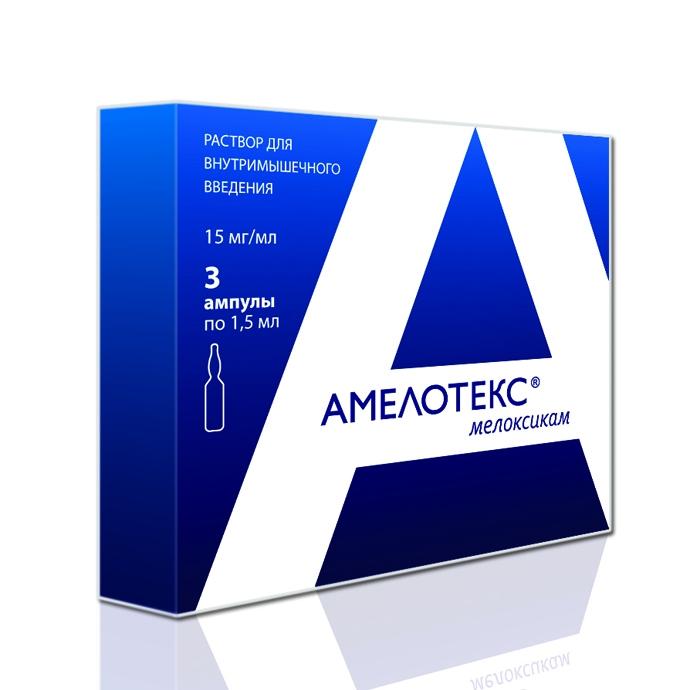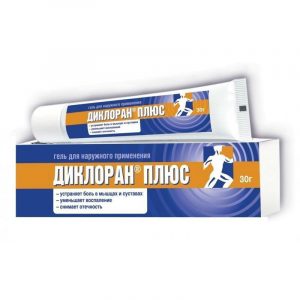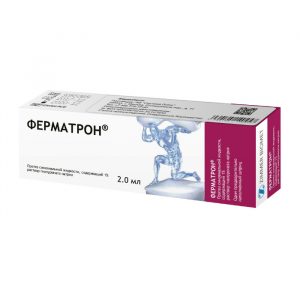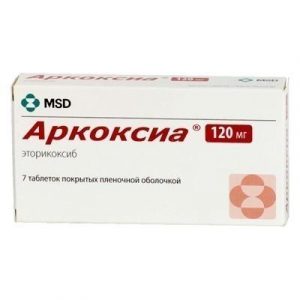Description
Release form
Intramuscular solution
Packing
3 pcs.
Pharmacological action
Amelotex is a non-steroidal anti-inflammatory drug that has anti-inflammatory, antipyretic, analgesic effects.
Selectively inhibits the enzymatic activity of cyclooxygenase-2. Suppresses the synthesis of prostaglandins in the area of inflammation to a greater extent than in the mucous membrane of the stomach or kidneys. Less commonly, it causes erosive and ulcerative lesions of the gastrointestinal tract.
The enolic acid derivative belongs to the class of oxycams.
Indications
Rheumatoid arthritis osteoarthritis osteoarthritis ankylosing spondylitis (ankylosing spondylitis) is an inflammatory and degenerative joint disease accompanied by pain.
Contraindications
Hypersensitivity to the active substance or auxiliary components
Contraindicated in the period after coronary artery bypass grafting
uncompensated heart failure
Complete or incomplete combination of bronchial asthma, non-relapsidose infections and non-relapsing syndrome h in history)
Erosive-ulcerative changes in the gastric mucosa or duodenum, active gastrointestinal bleeding
Inflammatory bowel disease (ulcerative colitis, Crohn’s disease)
Cerebrovascular bleeding or other bleeding
Severe liver failure or active liver disease
Severe renal failure in patients not undergoing dialysis (creatinine clearance less than 30 ml / min), progressive kidney disease, including confirmed hyperkalemia
Pregnancy, breastfeeding
Children under 15 years of age.
Caution
To reduce the risk of developing adverse events, the minimum effective dose should be used with the smallest possible short course for coronary heart disease, cerebrovascular disease, congestive heart failure, dyslipidemia / hyperlipidemia, diabetes mellitus, peripheral artery disease, smoking, creatinine clearance less than 60 ml / min anamnestic data on the development of gastric ulcer, in the presence of Helicobacter pylori infection, in old age, with prolonged use of non-steroidal anti-inflammatory drugs, frequent alcohol consumption, severe somatic diseases, concomitant therapy with the following drugs: anticoagulants (e.g. warfarin), antiplatelet agents ( e.g. acetylsalicylic acid, clopidogrel), oral glucocorticosteroids (e.g. prednisone), selective serotonin reuptake inhibitors (e.g. Imer citalopram, fluoxetine, paroxetine, sertraline).
Special instructions
If peptic ulcers or gastrointestinal bleeding occur, side effects of the skin and mucous membranes develop, the drug should be discontinued. In patients with a decrease in circulating blood volume and reduced glomerular filtration (dehydration, chronic heart failure, surgery), the appearance of clinically pronounced chronic renal failure, which is completely reversible after drug withdrawal (in such patients, diuresis and renal function should be monitored at the beginning of treatment) . With persistent and significant increase in transaminases and changes in other indicators of liver function, the drug should be discontinued and control tests performed. In patients with an increased risk of side effects, treatment begins with a dose of 7.5 mg. In the terminal stage of chronic renal failure in patients on dialysis, the dose should not exceed 7.5 mg / day. During the treatment period, care must be taken when driving vehicles and engaging in other potentially dangerous activities that require an increased concentration of attention and speed of psychomotor reactions (with the appearance of dizziness and drowsiness).
Composition
1 ampoule (1.5 ml) contains meloxicam as an active substance – 15 mg
excipients: meglumine, glycofurfural, poloxamer 188, sodium chloride, glycerol, sodium hydroxide solution 1 M, water for injection
Dosage and administration of
Amelotex is administered intramuscularly, deeply – at 7.5 – 15 mg once a day.
With a slight or moderate decrease in renal function (creatinine clearance greater than 25 ml / min), as well as with cirrhosis in a stable clinical state, dose adjustment is not required. The initial dose in patients with an increased risk of side effects is 7.5 mg / day.
The maximum daily dose is 15 mg, in patients with severe renal failure on hemodialysis – 7.5 mg.
Side effects of the
From the digestive system: nausea, vomiting, belching, abdominal pain, constipation or diarrhea, flatulence, increased activity of hepatic transaminases, hyperbilirubinemia, stomatitis, erosive-ulcerative lesions of the gastrointestinal tract, colitis, perforation of the gastrointestinal tract, gastrointestinal bleeding (latent or explicit), hepatitis.
From the nervous system: dizziness, vertigo, headache, tinnitus, confusion, drowsiness, disorientation, emotional lability.
From the respiratory system: bronchospasm.
From the hemopoietic organs: anemia, leukopenia, thrombocytopenia.
From the side of the cardiovascular system: peripheral edema, increased blood pressure, flushes of blood to the skin of the face and upper chest, palpitations.
From the urinary system: edema, hypercreatininemia, increased serum urea concentration. In rare cases, acute renal failure, interstitial nephritis, albuminuria, hematuria.
From the sensory organs: conjunctivitis, visual impairment including blurred vision.
From the skin: itching, skin rash, urticaria, photosensitivity, bullous eruptions, erythema multiforme, toxic epidermal necrolysis.
Allergic reactions: angioedema, anaphylactoid, anaphylactic reactions.
Local reactions: burning and pain at the injection site are possible.
Storage conditions
In a dark place at a temperature of 8 to 25 ° C. Do not store in the refrigerator.
active substance
Meloxicam
Terms and conditions
prescription
I
form Solution for




